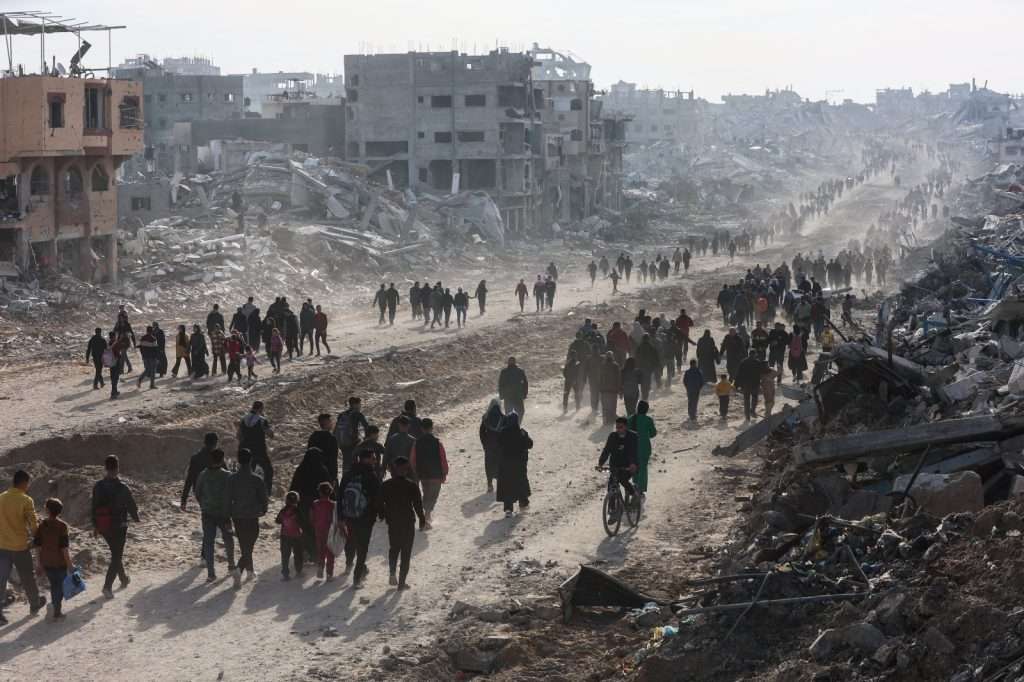Israel tells mediators of buffer zone plan along Gaza border

Israel has notified Egyptian and Qatari mediators of its plan to establish a security buffer zone along the full length of its border with Gaza, according to The National on July 16th.
This buffer zone will also include the coastal area along the Mediterranean, extending up to 2km in total.
Israel plans to relocate 600,000 Palestinians – including residents of the northern Gaza towns of Jabalia and Beit Lahia- to Al Mawasi, a narrow coastal area near Khan Younis, where a “humanitarian city” is to be established near the Egyptian border.
In this tightly controlled area, international aid groups would manage civilian affairs while Israel maintained full military control. The plan has faced strong condemnation, with critics calling it a covert effort to forcibly displace Palestinians into what resembles an open-air concentration camp.
Defence Minister Israel Katz stated that individuals entering the city would undergo screening to identify and exclude Hamas members. Once inside, he added, they would not be permitted to leave.
Hamas has alleged that Israel aims to retain control over at least 40% of the Gaza Strip as a condition of any potential ceasefire agreement.
“The Israeli plans amount to an attempt to re-demarcate the borders for Gaza,” said one of the sources. “They want Gaza carved up.”
Ceasefire negotiations have continued in Qatar without any major progress. According to the sources, talks hit an impasse due to disagreements over the scale of Israel’s pullout from Gaza, which Hamas considers inadequate.
The main elements being discussed include a proposed 60-day ceasefire, the release of hostages held in Gaza, increased humanitarian aid into the territory, and negotiations to end the conflict.
According to the sources, the Doha discussions have seen progress on a number of significant points, accompanied by optimistic remarks from US President Donald Trump and his Middle East envoy Steve Witkoff regarding the potential for a deal.
On July 13th, the US President expressed hope that the ceasefire negotiations would be “straightened out.”
However, aside from the dispute over Israel’s Gaza withdrawal, the talks risk falling apart if Israel insists on moving forward with its post-war plans.
Israel and the United States have not issued any immediate responses regarding the plans shared with mediators.
On July 16th, Israel announced the creation of a new military corridor in southern Gaza that now separates several towns located east of Khan Younis from the rest of the enclave – a move seen as likely to further reduce the chances of a ceasefire agreement.
Senior Hamas figure Basem Naim criticised the development, saying it signalled that Israel was not genuinely pursuing a ceasefire.
“It confirms the occupation’s long-term intentions and plans to remain inside the Strip, not to withdraw, and not to end the war. This contradicts everything it claims at the negotiating table or communicates to mediators,” Naim said on Facebook.
According to sources, Israel has also proposed that Egypt and the Palestinian Authority jointly oversee security in Gaza once the war ends. Egypt, however, has turned down the proposal, although it has expressed willingness to send security advisers to be part of an international mission tasked with training a new police force, the sources said.
Israel has again called for Hamas leaders and their families to go into exile and for the group to disarm. Hamas, for its part, has indicated it may be open to its leaders leaving Gaza, but only if Israel agrees not to target them. It has also expressed willingness to give up its weapons- but only in exchange for an official end to the war.
Israel maintains that the war will not conclude until Hamas is fully dismantled– both militarily and politically- and all remaining hostages are released. Hamas, on the other hand, says it will not accept any deal that does not include a full Israeli withdrawal from Gaza and an end to the conflict.
Israeli Prime Minister Benjamin Netanyahu said he would be open to discussing a longer-term ceasefire only after a temporary truce is in place and “only when Hamas lays down its weapons.”
The National, Maghrebi.org
Want to chase the pulse of North Africa?
Subscribe to receive our FREE weekly PDF magazine














